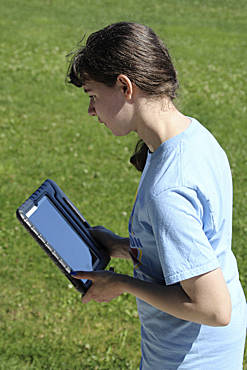It began with a haunting question asked by a special education teacher: “What are you going to do when the bus stops coming in September?”
It was posed to the parents of six students preparing for graduation out of the special education programs offered by the Sequim High School with no prospects of further education or community involvement.
It was March 1998.
Searching for an answer to that provocative question, parents George and Tresa Stuber, Mike and Debbie Campion, Russell and Nola Judd, and Rick and Cathie Osborne gathered in the Judds’ living room, sharing their concerns and their hopes for their children’s futures.
From that gathering a nonprofit was born. Within nine months, the fledgling all-volunteer organization originally called Special Needs Advocacy Parents (SNAP, later renamed Clallam Mosaic), was registered with the State of Washington, had filed for nonprofit status and begun weekly services.
Beyond offering recreational opportunities for adults with developmental disabilities, the group provided support and advocacy for families caring for individuals with special needs.
Three years later, between 2001 and 2002, SNAP transitioned from a grassroots group into a structured organization by hiring Karen Pierce, its first Executive Director.
With continued support from private, corporate and nonprofit foundations such as United Way of Clallam County and the Albert Haller Foundation, SNAP was regularly serving between 18-20 young adults and their families.
As Tresa Stuber and Tracy Wilson, then board members, explained, “Loneliness is the disability. Our programs are part of the answer.”
For individuals leaving school, many employed 10 hours or less per week and often without an easy entry into a community that frequently feared or ignored them, SNAP was providing solutions.
Seeing steady growth
During those early years, a successful partnership with the Sequim School District built a playground at the Helen Haller Elementary School equipped to accommodate all levels of physical ability (see accompanying picture taken at the playground’s opening). Initial programs had expanded and included an annual two- to three-day retreat for individuals with special needs at Camp Ramblewood.
The program’s success and its community were growing, but there was still more to achieve.
By 2008, SNAP was serving more than 40 individuals of ages 14 and older — providing life skill classes, recreational programs, special events, self-advocacy training, camps and more.
Individual and family support included respite, advocacy, person-centered planning services and a monthly developmental disabilities newsletter.
The organization begun in a living room that was “bursting at the seams,” outgrowing its home at the Sequim Community School and becoming a hub of knowledge, providing insights into the complex social services matrix.
SNAP was building community, enabling individuals with developmental disabilities to live beyond the scope of their disability.
In SNAP’s 10-year anniversary newsletter, then Executive Director Tresa Stuber noted that the decade long journey brought “amazing changes in participants as they learned to believe in themselves, their capabilities and gifts.
“It is this belief in themselves that has blossomed and made way for newfound independence … ”
As the organization entered its second decade, growing pains occurred. Drastic cuts to human services at the state and federal level had a severe impact on available contracts and grants. The global economic downturn meant that individual donors were cutting back on their philanthropic giving.
Between 2008 and 2012, these funding challenges combined with leadership transitions both on the Board of Directors and with the position of Executive Director, led to significant downsizing on several fronts. The monthly newsletter was discontinued. Camp Ramblewood became financially unfeasible, and one-on-one services diminished.
Most of all, to avoid confusion with the newly rebranded federal food stamp program claiming the acronym SNAP, a name change was needed. Special Needs Advocacy Parents became Clallam Mosaic.
Mosaic today
Today, Clallam Mosaic approaches its 20th year of providing services with renewed guidance from its leadership (Priya Jayadev, Tresa Stuber and Shawnda Hicks) and Board of Directors (Randy Brackett, Bob Grattan, Sandy Voelz, Karla Richardson and Mary Jane Duncan).
The organization is once again thriving and expanding upon its vision of building an inclusive community working together to enhance the quality of life for individuals with developmental disabilities.
During the past year, Clallam Mosaic served almost 80 area individuals with special needs and more than 100 families. Year-round day programs in both Sequim and Port Angeles provided leisure and recreational activities, educational classes and opportunities for creative expression through painting, crafts and theater arts.
The annual theater program culminates year-on-year with well-attended public performances at the Olympic Theatre Arts in Sequim and helps raise community awareness of developmental disabilities.
In addition, Mosaic sponsors Clallam County’s Parent-to-Parent program, offering mentorship, advice, advocacy and support to families caring for individuals with special needs. Clallam Mosaic remains the community resource for information about special needs topics.
And, once again, Clallam Mosaic is providing one-on-one services connecting participants with their broader community.
Has Clallam Mosaic achieved what those four families set out to accomplish back in 1998? In many ways, “yes.”
Is there still more to do? Absolutely, “yes.”
How to get involved
As a growing organization, Clallam Mosaic needs to draw out isolated individuals, to work in partnership with other area agencies and to engage local and state legislators ensuring individuals with special needs get the services, training and inclusive care they need.
Most importantly, Clallam Mosaic needs a permanent home and a stronger financial base.
This article is the first in an emerging series highlighting the needs, challenges and successes of individuals with developmental disabilities and their families, your friends and your neighbors.
If you would like to be involved with Clallam Mosaic, send an email to info@clallammosaic.org or call 360-681-8642.



